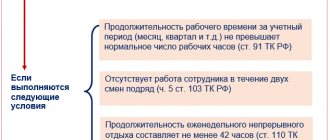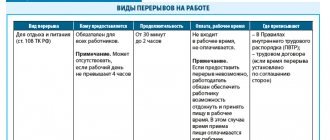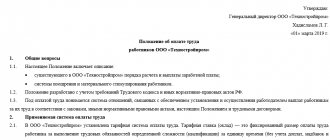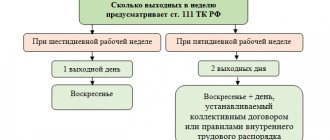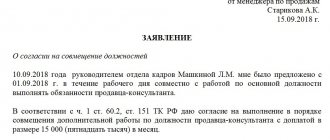Duty at home: labor code
In the usual sense, duty means the employee performs duties in accordance with the schedule created by the employer. In this case, the employee on duty must be at his workplace.
A different situation arises with the so-called home duty.
The employee spends most of his time waiting for a call to work, which may not happen.
This practice is used in the medical field, the Ministry of Emergency Situations, law enforcement agencies and some other sectors of the economy.
The Labor Code of the Russian Federation provides for this type of work shift only for medical workers (Labor Code of the Russian Federation, Art. 350).
In addition, home duty may be established by sectoral regulations of the relevant ministries and departments.
A similar operating mode is used in the railways, energy and communications sectors, etc.
In principle, every employer can establish this type of duty for employees. At the same time, it is important to remember that home duty should be justified by technological necessity, and not by management’s desire to use workers’ labor 24/7.
For example, it would be justified to be on duty at home on a telecommunications center electrician's holiday. He will be obliged to promptly eliminate problems when they arise.
And working from home is completely unsuitable for an office manager if the company operates on a standard five-day work week schedule.
Home duty cannot be used as a substitute for overtime.
This practice of minimizing labor costs is a violation of labor laws and, accordingly, is fraught with penalties for the employer.
In order to use this working time schedule for employees, you must:
- introduce duty at home into the regulations on personnel and remuneration;
- obtain employees’ consent to such an addition to the working regime;
- introduce summarized working time recording for duty officers;
- create a duty schedule.
Time spent on duty at home is included in the total working time.
Therefore, when drawing up a schedule for such duty, you need to take into account the amount of time worked by the employee, and also remember the ban on working two shifts in a row.
In addition, certain categories of employees, for example, minors or pregnant women, cannot be involved in this type of duty.
Duty on the “telephone” on days off.
My question concerns “home duty”. Situation. The employer wants to issue an order to establish “telephone duty” at home on weekends. Duty is a way of organizing work when an employee, being on a legal day off, must “be on duty” at the telephone, and, if necessary, “on call” come to work to perform any tasks (usually unforeseen). And, it would seem, everything is clear, if we engage an employee to work on a day off, it is necessary to follow the procedure for attracting such work, as well as pay for the work at an increased rate. However, what should you do if an employee was “on duty” at the phone on a day off, but in the end the employer did not need to call him to work? Question. 1) How should this time be paid (or compensated)? 2) Is it possible to stipulate this obligation in an employment contract or Collective Agreement? Should there be any additional payment for this? Or can this obligation be prescribed “just like that”? 3) If an employee is called to work on a day off, is travel time counted as working time? Can the Employee count on paying for a taxi (if it is evening, the bus rarely runs or no longer runs) Sincerely, Alexander
Answer: Home duty is established only for medical workers. If the employee is not one of them, and if we are not talking about emergency cases, then the employer must obtain consent to perform work within the framework of duty at home. Duty on a working day (outside working hours) must be paid as overtime: for the first two hours of work at least one and a half times the rate, for subsequent hours at least twice the rate. Duty on a weekend or holiday is compensated by double pay or an additional day of rest, regardless of whether there is a need to call the employee or not. The Labor Code of the Russian Federation does not provide for the obligation of the employer, at his own expense, to deliver personnel working at night to their place of residence, or to compensate the employee for the cost of travel to their place of residence. Moreover, such an obligation may be provided for by a local regulatory act of the organization, a collective agreement, or an employment contract with a specific employee.
Legal basis: In accordance with Art. 350 of the Labor Code of the Russian Federation, with the consent of medical workers of medical organizations, they can establish duty at home in order to implement the program of state guarantees of free provision of medical care to citizens in an emergency or emergency form. Duty at home is the stay of a medical worker of a medical organization at home while waiting to be called to work (to provide medical care in an emergency or urgent manner). When taking into account the time actually worked by a medical worker of a medical organization, the time spent on duty at home is taken into account in the amount of one-half of an hour of working time for each hour of duty at home. The total working time of a medical worker of a medical organization, taking into account the time on duty at home, should not exceed the standard working time of a medical worker of a medical organization for the corresponding period. By virtue of Art. 91 of the Labor Code of the Russian Federation, working time is the time during which an employee, in accordance with the internal labor regulations and the terms of the employment contract, must perform labor duties, as well as other periods of time that, in accordance with the Labor Code of the Russian Federation, other federal laws and other regulatory legal acts of the Russian Federation Federations refer to working hours. According to Part 1 of Art. 99 of the Labor Code of the Russian Federation, overtime work is work performed by an employee on the initiative of the employer outside the working hours established for the employee: daily work (shift), and in the case of cumulative accounting of working hours - in excess of the normal number of working hours for the accounting period. An employer's involvement of an employee in overtime work is permitted with his written consent in the following cases: 1) if it is necessary to perform (finish) work begun, which, due to an unforeseen delay due to technical production conditions, could not be performed (finished) during the working hours established for the employee, if failure to perform (non-complete) this work may result in damage or destruction of the employer’s property (including property of third parties located at the employer, if the employer is responsible for the safety of this property), state or municipal property, or create a threat to the life and health of people; 2) when carrying out temporary work on the repair and restoration of mechanisms or structures in cases where their malfunction may cause the cessation of work for a significant number of workers; 3) to continue work if the replacement employee fails to appear, if the work does not allow a break. In these cases, the employer is obliged to immediately take measures to replace the shift worker with another employee (Part 2 of Article 99 of the Labor Code of the Russian Federation). An employer's involvement of an employee in overtime work without his consent is permitted in the following cases: 1) when performing work necessary to prevent a catastrophe, industrial accident or eliminate the consequences of a catastrophe, industrial accident or natural disaster; 2) when carrying out socially necessary work to eliminate unforeseen circumstances that disrupt the normal functioning of centralized hot water supply, cold water supply and (or) sewerage systems, gas supply systems, heat supply, lighting, transport, communications; 3) when performing work the need for which is due to the introduction of a state of emergency or martial law, as well as urgent work in emergency circumstances, that is, in the event of a disaster or threat of disaster (fires, floods, famine, earthquakes, epidemics or epizootics) and in other cases, threatening the life or normal living conditions of the entire population or part of it (Part 3 of Article 99 of the Labor Code of the Russian Federation). In other cases, involvement in overtime work is permitted with the written consent of the employee and taking into account the opinion of the elected body of the primary trade union organization (Part 4 of Article 99 of the Labor Code of the Russian Federation). The duration of overtime work should not exceed 4 hours for each employee for two days in a row and 120 hours per year (Part 6 of Article 99 of the Labor Code of the Russian Federation). In accordance with Part 1 of Art. 152 overtime payment is made for the first two hours of work at least one and a half times the rate, for subsequent hours - at least twice the rate. Specific amounts of payment for overtime work may be determined by a collective agreement, local regulations or an employment contract. At the request of the employee, overtime work, instead of increased pay, can be compensated by providing additional rest time, but not less than the time worked overtime. According to Part 2 of Art. 113 of the Labor Code of the Russian Federation, the involvement of employees in work on weekends and non-working holidays is carried out with their written consent if it is necessary to perform unforeseen work, the urgent implementation of which subsequently determines the normal work of the organization as a whole or its individual structural divisions, or an individual entrepreneur. Involving employees to work on weekends and non-working holidays without their consent is permitted in the following cases: 1) to prevent a catastrophe, industrial accident or eliminate the consequences of a catastrophe, industrial accident or natural disaster; 2) to prevent accidents, destruction or damage to the employer’s property, state or municipal property; 3) to perform work the need for which is due to the introduction of a state of emergency or martial law, as well as urgent work in emergency circumstances, that is, in the event of a disaster or threat of disaster (fires, floods, famine, earthquakes, epidemics or epizootics) and in other cases, threatening the life or normal living conditions of the entire population or part of it (Part 3 of Article 113 of the Labor Code of the Russian Federation). In other cases, involvement in work on weekends and non-working holidays is permitted with the written consent of the employee and taking into account the opinion of the elected body of the primary trade union organization (Part 5 of Article 113 of the Labor Code of the Russian Federation). Employees are recruited to work on weekends and non-working holidays by written order of the employer (Part 8 of Article 113 of the Labor Code of the Russian Federation). In accordance with Part 1 of Art. 153 of the Labor Code of the Russian Federation, work on a day off or a non-working holiday is paid at least double the amount. Specific amounts of payment for work on a day off or a non-working holiday can be established by a collective agreement, a local regulatory act adopted taking into account the opinion of the representative body of workers, or an employment contract (Part 2 of Article 153 of the Labor Code of the Russian Federation). At the request of an employee who worked on a day off or a non-working holiday, he may be given another day of rest. In this case, work on a weekend or a non-working holiday is paid in a single amount, and a day of rest is not subject to payment (Part 3 of Article 153 of the Labor Code of the Russian Federation). In accordance with Art. 41 of the Labor Code of the Russian Federation, a collective agreement may include obligations of employees and the employer on the following issues: - forms, systems and amounts of remuneration; — payment of benefits, compensation; — a mechanism for regulating wages taking into account rising prices, inflation levels, and the fulfillment of indicators determined by the collective agreement; — employment, retraining, conditions for releasing workers; — working hours and rest time, including issues of granting and duration of vacations; — improving the working conditions and safety of workers, including women and youth; respecting the interests of workers during the privatization of state and municipal property; — environmental safety and health protection of workers at work; guarantees and benefits for employees combining work with training; — health improvement and recreation for employees and members of their families; — partial or full payment for employees’ meals; — control over the implementation of the collective agreement, the procedure for making changes and additions to it, the responsibility of the parties, ensuring normal conditions for the activities of employee representatives, the procedure for informing employees about the implementation of the collective agreement; — refusal to strike if the relevant conditions of the collective agreement are met; — other issues determined by the parties. A collective agreement, taking into account the financial and economic situation of the employer, may establish benefits and advantages for employees, working conditions that are more favorable in comparison with those established by laws, other regulatory legal acts, and agreements.
Compensation for work on holidays
In accordance with Article 153 of the Labor Code of the Russian Federation, work on a non-working holiday can be compensated in two ways: by providing another day of rest at the employee’s request, or by paying no less than double the amount.
If an employee takes a day off, work on a day off or a non-working holiday is paid at a single rate, but the day of rest is not subject to payment. It should be noted that current legislation does not provide for the dependence of the duration of rest on the duration of work on a weekend or non-working holiday. In particular, if an employee worked three hours on a holiday, then he will rest the whole day. This is the position of Rostrud, set out in letter No. 1936-6-1 dated 07/03/2009. The date of leave is determined by agreement of the parties to the employment contract.
As for the second method of compensation, the law establishes a minimum threshold: payment of no less than double the amount. However, according to Part 2 of Article 153 of the Labor Code of the Russian Federation:
Specific amounts of payment for work on a day off or a non-working holiday may be established by a collective agreement, a local regulatory act adopted taking into account the opinion of the representative body of employees, or an employment contract.
Analysis of a typical duty situation on weekends and holidays: payment
When calculating compensation for work on a day off, difficulties usually arise regarding the calculation of compensation, but here it is enough to be guided by the provisions of Art. 153 Labor Code of the Russian Federation:
- Under the transaction, payment is made at least double the amount;
- If the employee receives a salary or tariff rate - at least one daily or hourly rate or tariff.
Let's look at the situation using a specific example:
Sazonova N.G. Works in an organization that has a five-day work schedule. According to the manager's order, she must be called on duty every Saturday from 09:00. 00 min. until 13 o'clock 00 min. According to the law, the standard working time is 40 hours a week, and she works it out on Friday. Her average earnings per hour are 200 rubles.
Thus, to calculate compensation you need to do the following:
4 hours of processing x 200 rub. = 800 rub. x 2 = 1600 rub. – the amount she needs to pay for working on duty on a day off.
You can go another way, if the employee agrees with this: provide him with 8 hours of time off on any day at his discretion.
What is duty?
It should be noted that the Labor Code of the Russian Federation does not contain a general concept of “duty”. At present, the Decree of the Secretariat of the All-Union Central Council of Trade Unions dated 04/02/1954 No. 233 “On duty at enterprises and institutions” continues to be in force in the part that does not contradict the Labor Code of the Russian Federation. According to this resolution, duty means work on weekends and holidays with subsequent compensation by providing time off of the same duration as the duty within the next 10 days.
In 2022, it is expected that more than 20 thousand regulations of the USSR and the RSFSR will be repealed. Apparently, the issue of repealing the above act will also be considered.
